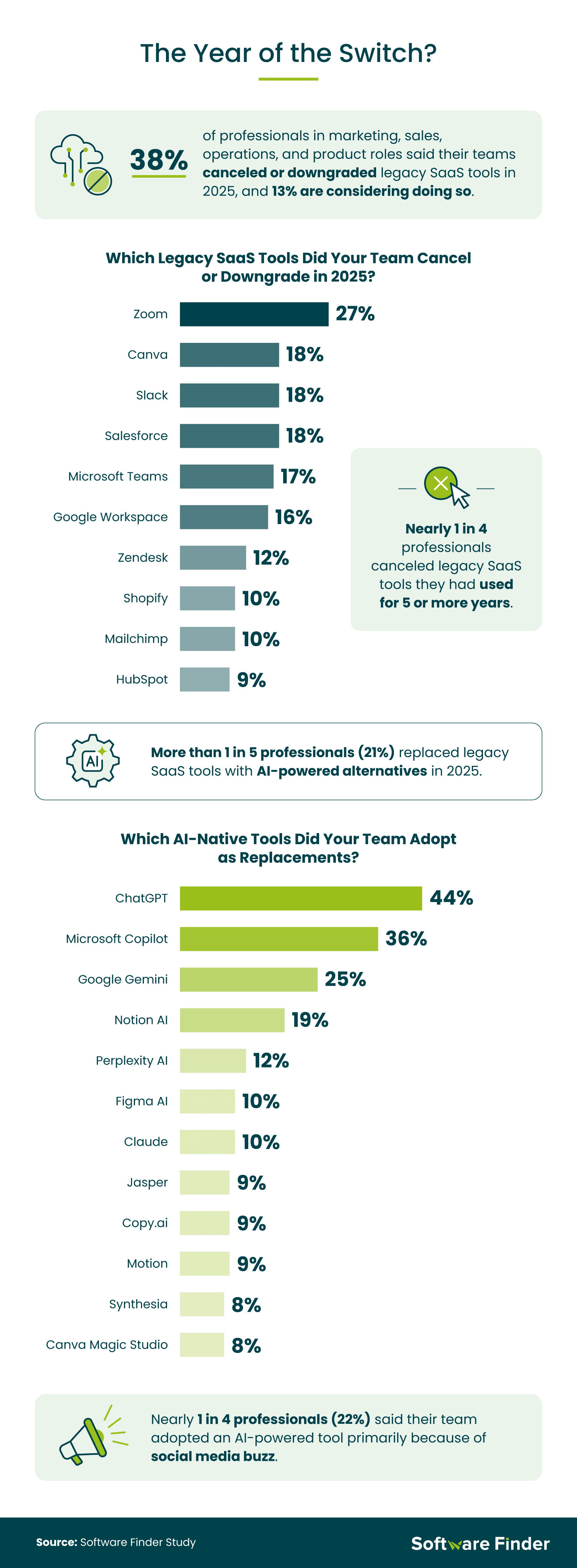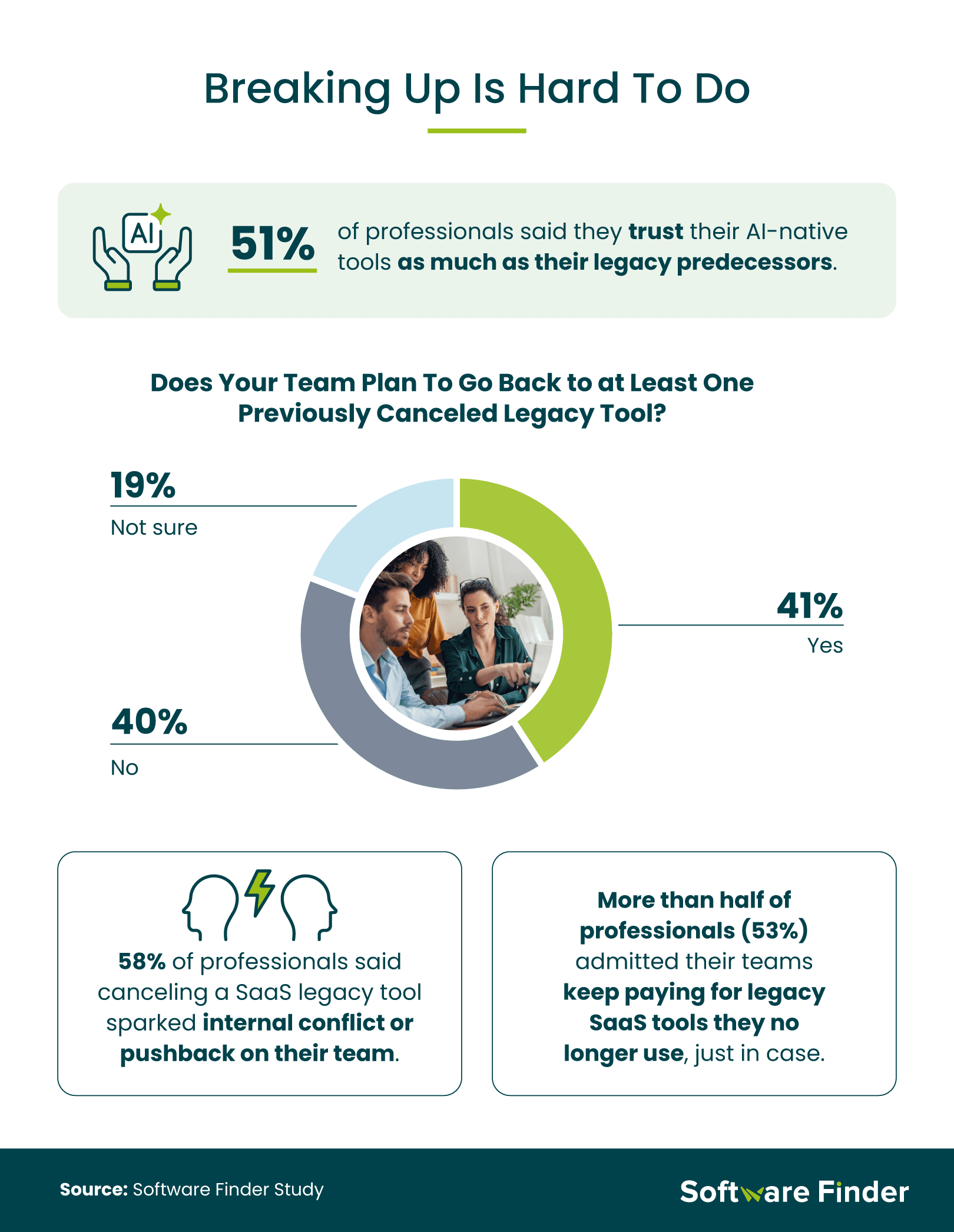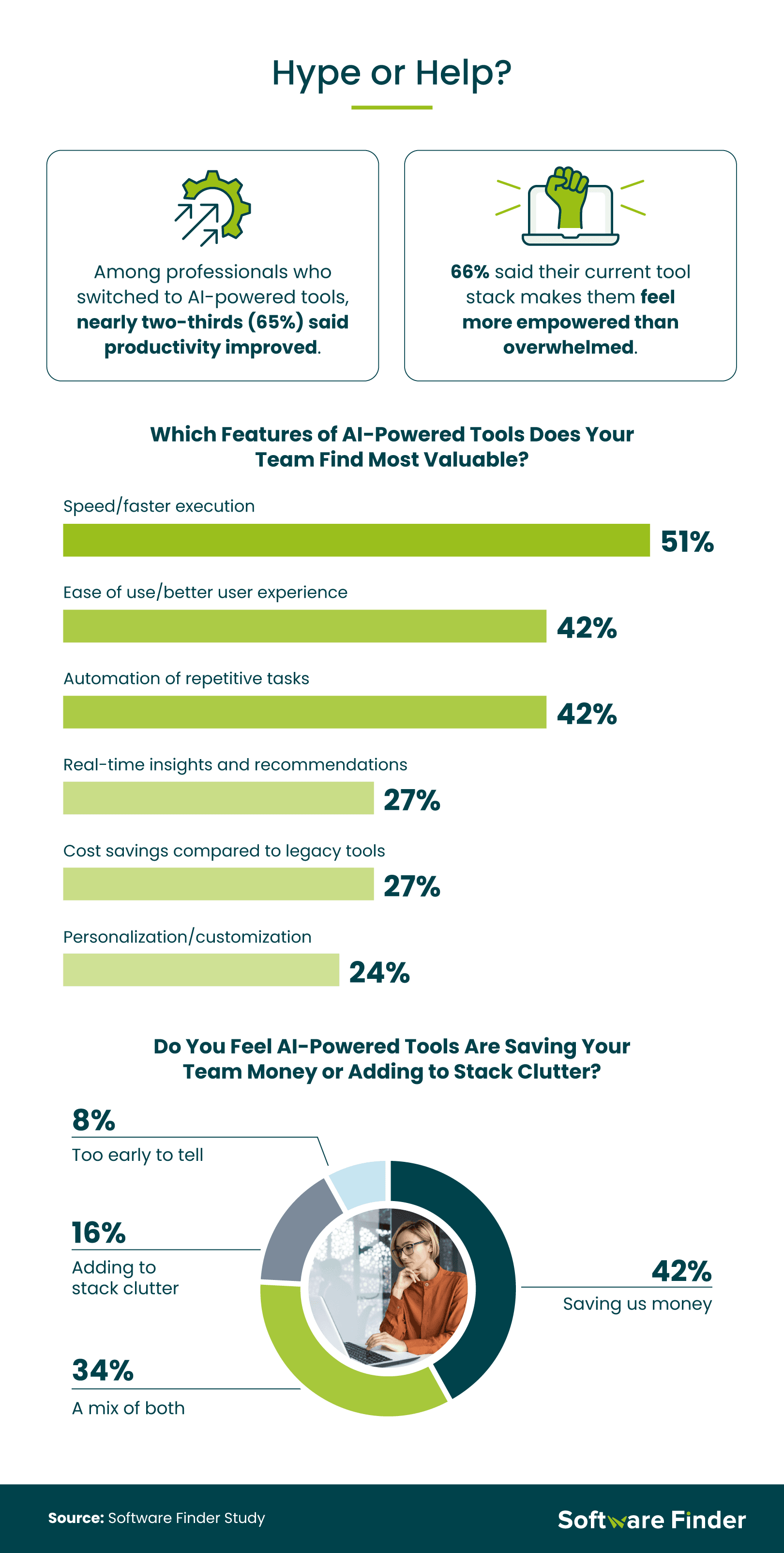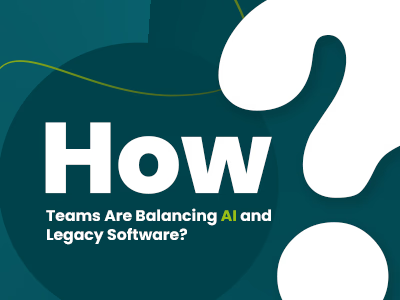Artificial intelligence tools are changing how teams manage their software stacks. In 2025, some professionals reported replacing or scaling back traditional SaaS tools in favor of newer AI-powered options. Still, this shift is not absolute. Many organizations continue to rely on legacy platforms, and some are even reconsidering recent changes.
To understand how software preferences are evolving, Software Finder surveyed over 1,000 U.S.-based professionals in marketing, sales, product, and operations roles. The results reveal a mix of adoption, hesitation, and strategy as teams evaluate what works best.
As teams evaluate their software stacks, some tools are being retired while others remain essential. Shifts in cost, features, and team needs are all playing a role in what stays and what goes.

In 2025, 38% of professionals said their teams canceled or downgraded legacy SaaS tools. Twenty-one percent reported switching to AI-powered alternatives, with workers most commonly replacing software with ChatGPT (44%).
Product management (55%) and marketing teams (53%) led in significant software reductions. Sales and project management teams, however, were slower to act, with only about a third in each group making cuts. The trend was most pronounced in mid-sized companies, where 51% canceled or downgraded legacy SaaS tools. Small businesses followed at 42%, while large enterprises showed more hesitation, with only 33% making similar moves.
By industry, the shift away from legacy software was strongest among tech (52%), marketing (50%), and manufacturing (35%) professionals. But parting ways with trusted platforms hasn't been easy. Respondents ranked Zoom (14%), Microsoft Teams (11%), and Salesforce (11%) as the most emotionally difficult tools to let go of.
Cost was the number one driver behind these cancellations, cited by 50% of respondents. Other reasons included team consensus (35%), usability issues (27%), lack of AI functionality (25%), and poor AI integration (21%). Social buzz even played a surprising role: 22% said their team adopted an AI tool primarily due to hype on platforms like LinkedIn and X.
- "We talk to a lot of teams that are rethinking their software budgets. AI gets the headlines, but what really drives change is when a tool stops meeting day-to-day needs," said Shane Elahi, COO at Software Finder. "If something's not working or doesn't fit the way people actually work now, it's going to get replaced."
While AI adoption is rising, many professionals are still holding on to familiar platforms. In some cases, teams are even bringing back previously canceled tools after encountering setbacks.

Canceling long-standing tools wasn't always smooth sailing. Over half of professionals (58%) said their team faced internal conflict or pushback after dropping a legacy SaaS product. In marketing, tech, and retail, nearly half of professionals (47%, 45%, and 45%, respectively) said their teams plan to bring back at least one previously canceled tool.
- "There's a comfort level with tools teams have used for years. Even if they're not perfect, people know how to use them and trust them," said Adnan Malik, CEO of Software Finder. "That familiarity can be hard to give up, especially when new tools come with a learning curve."
Another 53% of professionals said their teams continue paying for unused legacy tools just in case they may need them. This safety-net mentality may reflect a lack of confidence in newer AI tools or concern about disruption, suggesting some teams aren't fully ready to let go of traditional platforms.
New AI tools promise speed and efficiency, but not every rollout goes smoothly. From onboarding issues to feature gaps, teams are learning that innovation comes with trade-offs.

While 65% of professionals who switched to AI tools reported improved productivity, the transition wasn't without issues. Over half (52%) encountered a learning curve or onboarding difficulties. Other common problems included integration issues with existing tools (37%), team resistance (34%), and AI inaccuracies or 'hallucinations' (24%).
- "AI can absolutely help teams work faster, but only if the rollout is handled right," said Marium Lodhi, CMO at Software Finder. "We've seen plenty of cases where teams jump in too quickly and end up dealing with confusion, extra work, or tools that don't deliver what they promised."
For some teams, the risks outweighed the benefits. Twenty-six percent of professionals said they adopted an AI tool that turned out to be all hype, with no real return on investment. Others found the new tools lacking, with 20% citing missing or limited features compared to their previous systems.
Financial outcomes from AI-powered tools have also been mixed. While 42% of professionals said these tools helped their team save money, 16% reported that they only added to software stack clutter. Another 34% said they are saving money but also dealing with increased clutter.
The data shows that many teams are making changes to their software stacks, but not everyone is moving in the same direction. Some are adopting AI tools to cut costs or increase efficiency, while others are sticking with the systems they know. In some cases, tools that were removed are now being brought back. Internal disagreements and mixed outcomes suggest that teams are still testing what fits. For now, most are blending new and old tools rather than replacing one with the other.
Methodology
This survey was conducted to understand whether 2025 represents a tipping point in workplace software adoption, specifically whether professionals are replacing long-time SaaS platforms with AI-native alternatives. We surveyed 1,008 U.S.-based professionals in September 2025. Respondents were required to be currently employed in one of the following roles: marketing, sales, operations, product management, or project management.
About Software Finder
Software Finder helps businesses discover the right software solutions through expert comparisons, user reviews, and curated recommendations. Whether you're evaluating AI-native tools or looking to streamline your current tech stack, SoftwareFinder offers resources tailored to IT decision-makers, department heads, and business leaders.
Fair Use Statement
If you'd like to share or reference the findings from this article, you're welcome to do so for noncommercial purposes. Just be sure to include proper attribution with a link back to Software Finder.
